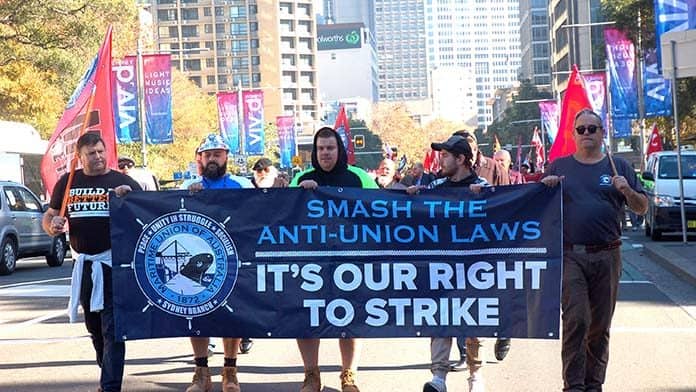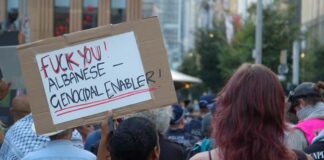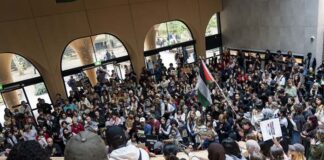Four hundred unionists in Sydney led a boisterous march on the bosses’ court, the Fair Work Commission on 29 May, demanding the right to strike—and pledging to fight for it.
The maritime union Sydney branch initiated the rally, shutting down Port Botany for four hours and bussing workers from all three terminals into the city. They were joined by other maritime workers from the ferries, the Port Authority and elsewhere.
There were also contingents from the construction union, the electricians and public service unions, finance sector union, manufacturing union, and also university workers.
The rally marched on the Fair Work Commission, chanting, “the workers united will never be defeated” and “one struggle one fight, we demand the right to strike”.
The commission is the industrial tribunal that has terminated agreements, cut penalty rates, fined unions millions of dollars and earlier in the year banned the NSW train drivers from going on strike.
The rally followed a successful Right to Strike forum held in mid-April. In calling the rally, the maritime union stressed that the current laws boxed them in, preventing officials from entering sites to organise workers and issuing massive fines penalising strike action.
Change the system
“We have seen our freedoms slowly taken away,” said MUA Sydney deputy branch secretary Paul Keating. “It is not enough to change the rules; we need to change the system. We need the right to strike, and we’re going to do it anyway. And it won’t be coppers and it won’t be government institutions that stop us.”
A mine worker from Oaky North, where workers were locked out by Glencore for 238 days, pointed out the double standards of the current system.
“The train workers wanted to go out for a 24-hour stoppage but this lot [the Commission] stepped in. You can have an employer, a multinational, lock you out for 238 days and no one says anything. But when you want to shut down the trains, the buses and all the rest of it for 24 hours to improve our conditions, they step in and stop that.”
One of the catalysts for the rally was a terrible accident at Hutchison port terminal, with a worker ending up in a coma. It had come after union delegates repeatedly raised safety issues only to have the bosses ignore them. After the accident, which almost killed someone, the company ordered everyone straight back to work, Erima Dall, an MUA rank-and-file member, said.
“It was only because of the strength on the job, our delegates structures and safety reps, that we were actually able to stand firm and refuse to continue to work in those unsafe conditions as is our right under legislation,” she said. “We held firm and did that for two weeks until the company was forced to the table to make some changes.”
“We cannot wait for Labor to be elected,” she added. “We couldn’t wait for Labor before we had to make that decision on the job. We need to get rid of this Turnbull government, we need to change the rules but we need to change the rules on the job right now, in struggle, every day. To fight for the right to strike we need to break the anti-strike rules.”
A construction worker from the newly formed CFMMEU said: “If a worker hasn’t been paid, they have a right to stop work. If a job or any industry is not safe, then pack up and go home. We’ve got a right to stop. The laws in this country have changed too far the other way. We need to get them back. We’ve got another rally coming up in late July or August. We’re expecting everyone, every worker in this state to come out here and march.”
By Miro Sandev






